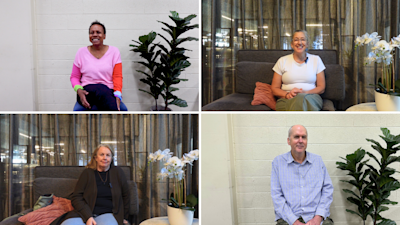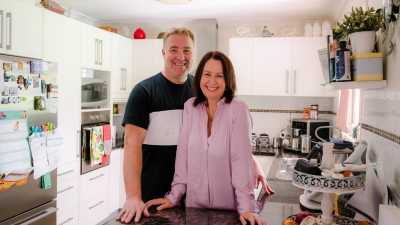Larissa and Mauro have been carers with Life Without Barriers for nearly five years and during that time they have opened their home to many children

Putting Children First for one Brisbane foster carer couple means going to any length to ensure cultural connection and identity are a priority for the young child in their care – and if that means holding a smoking ceremony to ensure their house is cleansed of any negative spirits, then that’s what they’ll do.
Larissa and Mauro have been carers with Life Without Barriers for nearly five years and during that time they have opened their home to many children, from newborns to five-year-olds, to emergency, respite and primary placements.
Larissa said their motivation for caring for infants comes from “a desire to ‘hold space’ for the infant in their care while we are assisting with reunification plans with Child Safety.”
And part of that ‘holding space’ means knowing the importance of cultural identity and connection, even at an early age. Larissa and Maura currently care for Fred* a baby boy who came into their care at 4 weeks of age in July 2018 and is Aboriginal.
Now two, little Fred had been recently experiencing broken sleep – often waking upset through the night. An Aboriginal liaison officer at a medical appointment spoke about how a smoking cleansing session may support Fred if there were any bad spirits in the home.
Not needing to be told twice, Larissa was extremely open to supporting this and their Life Without Barriers Cultural Support Planner, Silvia was asked to come to their home to complete the cleansing.
“It was just lovely,” said Silvia.
It was a very positive process and the care team felt it was wonderful how supportive Larissa and Mauro are of young Fred and understanding his culture.
“Normally, a smoking ceremony would have been done by a traditional owner but due to COVID-19 restriction, that was not possible. I was, however, able to do a cleansing ceremony which, while not as strong as the traditional smoking ceremony, rejuvenates and heals and strengthens your spirit.”
Larissa’s curiosity about Aboriginal peoples and how this connects to a child’s wellbeing and identity has led her to collaborate with Silvia from the start in order to better understand Fred’s cultural connections.
“From the very start of the placement, Larissa has been very supportive of learning about Fred’s culture and supporting him to attend play groups and events that support his cultural identity,” said Silvia.
“We were really excited not long ago, as we were able to find a last name for Fred’s family and so we were able to track down his traditional Country. Before this we did not really know much. Finding the missing piece was amazing, and Larissa, Mauro and the all the team celebrated this wonderful information for Fred.”
While neither Larissa nor Mauro are Aboriginal or Torres Strait Islanders, it was noted in Larissa’s initial training feedback that she demonstrated a detailed understanding of the historical context of the treatment of Aboriginal and Torres Strait Islanders and was able to share this with the broader group in a comprehensive and sensitive manner.
“Even though it’s not quite the same, Mauro and I know the importance of cultural identity and connection because of Mauro’s Italian background. Mauro still speaks Italian to family and friends." Larissa said
It’s so important that we know who we are, where we have come from and what our heritage is.
*Names have been changed to protect the children in care.
Main image: Stock photo / Getty


